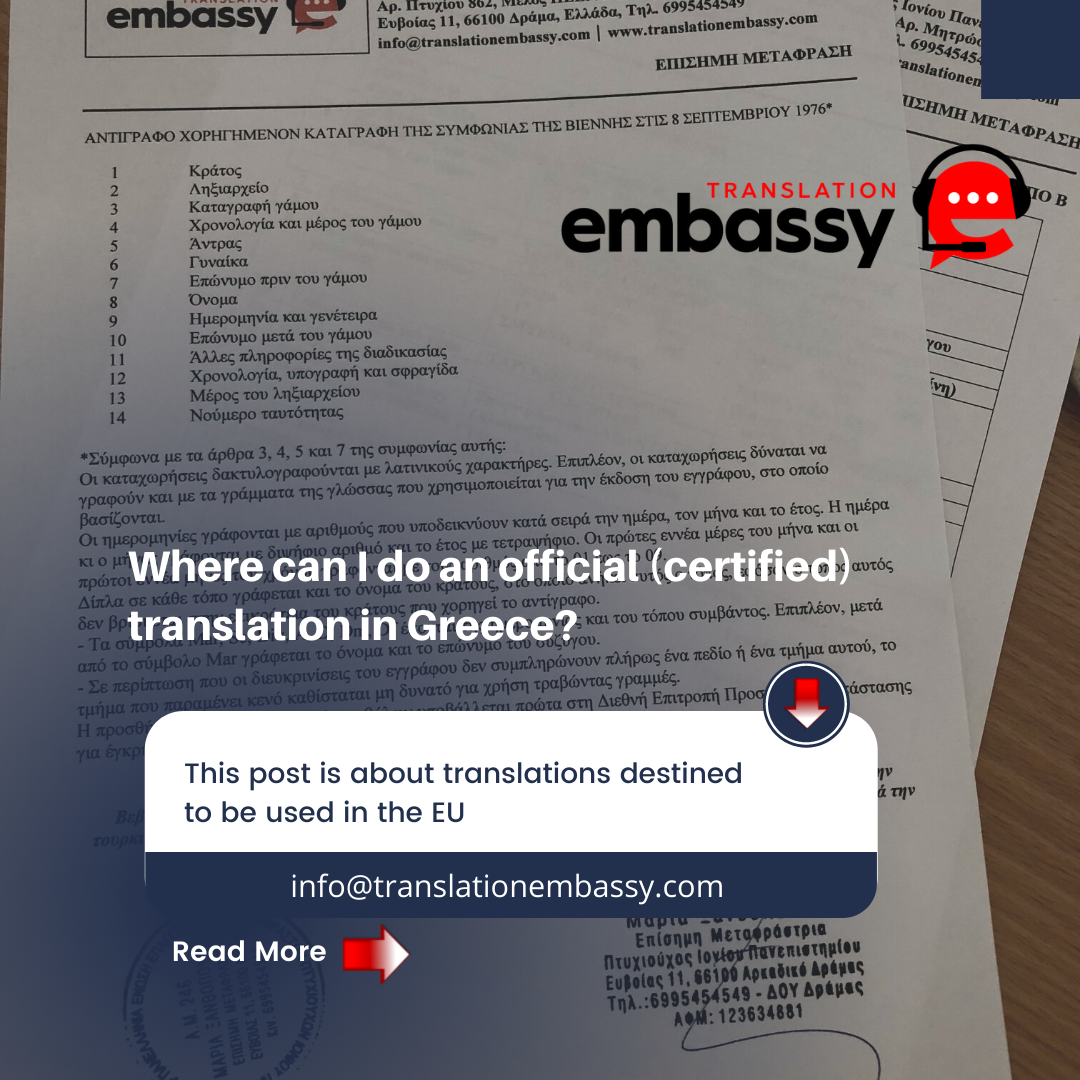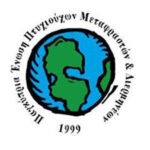(This post is about translations destined to be used in the EU)
In the previous post we clarified what you should do when you need to present an official translation to Greek authorities. But what happens when you need to submit documents issued in Greece to public authorities abroad? Can I use the same translators who helped me with the Greek authorities also for this case? Will their translations be valid abroad? How can I be sure that my papers will not be rejected?
All these are reasonable questions clients often have. Although the fundamental nature and purpose of a translation is to ensure a cross-border transfer of knowledge and information, paradoxically there is no universal system regarding the production of official translations for international use. Each country has basically its own legislation governing the status of official translation. Yet, the situation is not totally chaotic. In the case of the EU, there is indeed relevant legislation simplifying things for citizens and businesses.
Cross-border recognition of official translations among EU member states is based on the principle of mutual trust, which is founded in article 4 of the Treaty on European Union (TEU). This principle also sets the foundation of the EU Regulation 2016/1191 on promoting the free movement of citizens by simplifying the requirements for presenting certain public documents in the EU. Article 6 of this Regulation explicitly specifies that “a certified translation carried out by a person qualified to do so under the law of a Member State shall be accepted in all Member States”.
What is more, in the EU e-Justice portal, Member States have declared the list of persons qualified, in accordance with national law, to carry out certified translations. For the scope of Regulation 2016/1191, the qualified persons for Greece are:
- the Translation Service of the Ministry of Foreign Affairs (this was abolished by Law 4781/2021 in September 2021 and it is now replaced by the Certified Translators Registry-Μητρώο Πιστοποιημένων Μεταφραστών, formed by former Translation Service employees), or
- an authorised permanent civil servant of the Greek consular authority in the issuing country, or
- a graduate translator of the Department of Foreign Languages, Translation and Interpreting of the Ionian University, or
- a Greek lawyer who fulfils the conditions set out in Article 36 of Law 4194/2013 of the Lawyers’ Code (Government Gazette, Series I, No 208).
This means practically that if you are located in Greece and you are in need of translations to be submitted in other EU States, you should get in touch with the above-mentioned professionals.
Which documents fall into the scope of Regulation 2016/1191?
The public documents concerned by the Regulation are listed in Article 2, which reads as follows:
- This Regulation applies to public documents issued by the authorities of a Member State in accordance with its national law which have to be presented to the authorities of another Member State and the primary purpose of which is to establish one or more of the following facts:
- (a) birth;
- (b )a person being alive;
- (c) death;
- (d )name;
- (e) marriage, including capacity to marry and marital status;
- (f) divorce, legal separation or marriage annulment;
- (g) registered partnership, including capacity to enter into a registered partnership and registered partnership status;
- (h) dissolution of a registered partnership, legal separation or annulment of a registered partnership;
- (i) parenthood;
- (j) adoption;
- (k) domicile and/or residence;
- (l) nationality;
- (m) absence of a criminal record, provided that public documents concerning this fact are issued for a citizen of the Union by the authorities of that citizen’s Member State of nationality.
- This Regulation also applies to public documents the presentation of which may be required of citizens of the Union residing in a Member State of which they are not nationals when those citizens wish to vote or stand as candidates in elections to the European Parliament or in municipal elections in their Member State of residence, under the conditions laid down in Directive 93/109/EC and Council Directive 94/80/EC (11) respectively.
What about other kinds of documents not mentioned in the Regulation 2016/1191?
In Article 26, the Regulation specifies that the Commission shall prepare a report, which will include among others an assessment of the appropriateness of the extension of the scope of this Regulation to public documents relating to matters other than those referred to in Article 2. This means practically that in the future it is possible to enrich the above-mentioned list with other documents as well.
For now, based on my experience with clients, I can say that generally EU public authorities rely on the qualified persons declared by Member States under the scope of the above-mentioned Regulation for other kinds of documents as well. In this context, we have successfully submitted translations as Ionian University Graduates pertaining also to diplomas and transcripts of records, school documents, court documents, medical certificates, notarial acts, professional licences, technical certificates etc., just to name a few examples.
To be sure, it is always a good idea to consult with the authority, which you intend to present the translations to, before assigning the task.
Translation Embassy provides official translations in cooperation with Graduate Translators of the Ionian University and lawyers. We support businesses of every branch in their transactions with Greek and EU public authorities and help them overcome bureaucratic obstacles.
To request our services get in touch at info@translationembassy.com and ask for a free consultation and quote.
This post is basically focused on businesses. However, we should also highlight that the same rules apply also for citizens and digital nomads.
Information on public documents as specified in the European e-Justice portal: https://e-justice.europa.eu/561/EN/public_documents?GREECE&member=1








